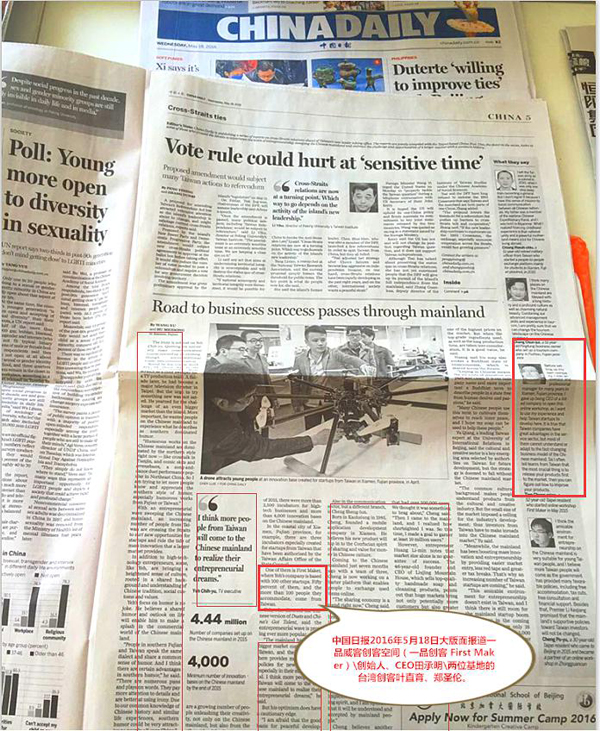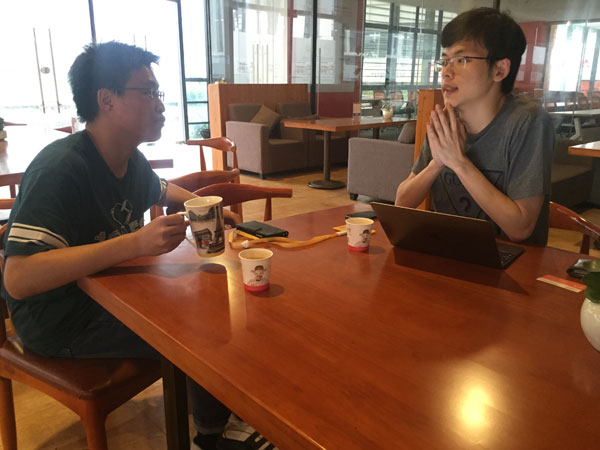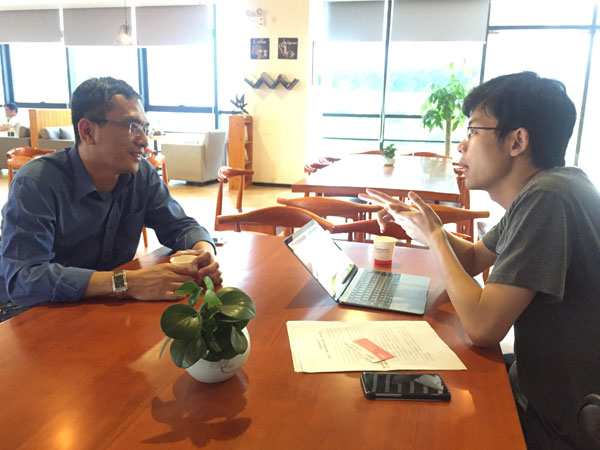5月18日,《中國日報》(China Daily)大版面報道了一品威客(企業一站式眾包服務平臺)旗下創業孵化服務品牌“一品創客”。
What?居然是全英文的報紙!沒錯,《中國日報》是中國國家英文日報,創刊于1981年,全球期均發行90余萬份,其中,海外期均發行60余萬份。

《中國日報》作為中國了解世界、世界了解中國的重要窗口,是國內外高端人士首選的中國英文媒體,是唯一有效進入國際主流社會、國外媒體轉載率最高的中國報紙,也是國內承辦大型國際會議會刊最多的媒體。
不得了!這么說,一品創客此次被報道,將被更多海外人士看到,一品威客也將走向世界。
《中國日報》5月18日第五版大版面報道一品創客,以下為版面情況。

一品創客兩位臺灣創客風采占了記者三分之二以上的筆墨。接下來,就一起來看看《中國日報》報道了什么?
臺灣創客葉直育的報道內容。
Quitting university because of boring, starting from scratch as a floor sweeper for a TV production team, 34-year-old Yeh Chihyu became a well-off TV show director in Taipei after 10 years' endeavor.
However, he is not satisfied: he wants his own company, and more importantly, he wants Chinese people to make a break from what he describes as north-dominated humor.
"Humorous works in China are dominated by northern style right now, like crosstalk in Tianjin, comic skits and song and dance duets in northeast China. So I am trying to let more people know about the southern style of humor, I mean humorous works from Fujian o r Taiwan."
因為覺得無趣,葉直育放棄了大學業,在臺北從為電視制作團隊掃地做起,進入電視圈。經過十年的努力,如今34歲的葉直育已經成為有名的電視節目導演。
然而,他并不滿意:他希望自己的公司,更重要的是,他希望中國人能從所謂的北方式的幽默間隙找到不一樣的東西。
“幽默作品在中國由北方風格主導,如天津相聲、東北的小品、二人轉。所以,我想讓更多的人了解南方風格的幽默,即來自福建和臺灣的幽默作品。”
With an entrepreneurial wave sweeping Chinese mainland, an increasing number of Taiwan people are crossing the Straits to surf new opportunities for startups.
隨著創業浪潮席卷中國大陸,越來越多的臺灣人們穿越海峽,尋找新的創業機會。
Some like Yeh are bringing a heightened sense of culture, rooted in a shared background and understanding of Chinese tradition, social customs and values of life.
有些人像葉直育一樣,帶來高相似度的文化,即植根于一個共享的背景和對中國傳統文化的理解,社會習俗和價值觀的生活。
Yeh believes shared humor and outlook on life will enable him make a splash in the commercial world of the mainland. His focus on humor is no joke.
"People in southern Fujian and Taiwan speak the same dialect and share a common sense of humor. And I think there are certain advantages in southern style humor. There are numerous puns and plays on words, they pay more attention to details and are better at using irony. Due to our common knowledge of Chinese history and similar life experiences, the southern style humor could be eye-catching to people all over China."
葉直育認為共享幽默和人生觀將使他在大陸商業世界引起轟動。他關注幽默不是一個笑話。
“人們在福建南部和臺灣說同樣的方言和共享一個共同的幽默感。我認為有一些優勢在南部風格的幽默,比如有大量的雙關語和文字游戲,南方人更加注重細節和更善于使用諷刺。由于我們中國歷史常識和類似的生活經歷,南方風格幽默可以引人注目。”
Nearly two years after Premier Li Keqiang introduced the idea of mass innovation and entrepreneurship during the summer Davos Forum in Tianjin, there is now echoing sound not only f rom the mainland, but also f rom the other side of the strait.
According to the government website, 4.44 million companies was set up in China in 2015, and by the end of 2015, China had over 2,500 incubators for high-tech businesses and more than 4,000 innovation bases all over the country.
In the coastal city of Xiamen, Fujian province, for example, there are three incubators especially founded for Taiwan startups and was authorized by the Taiwan Affairs Office of the State Council.
Among one of them was the First Maker, where Yeh's company based with another 100 more startup firms. 50 percent of the companies and over 100 people it accommodates came f rom Taiwan.
兩年前,國務院總理李克強在天津夏季達沃斯論壇提“大眾創業”和“企業家精神”概念。如今對此呼應的聲音從大陸傳到了海峽的另一邊。
根據政府網站數據顯示,444萬個公司于2015年在中國成立。到2015年底,中國有2500多個高科技企業孵化器和超過4000創新基地遍布全國。
例如,在沿海城市福建廈門,就有3個創業孵化基地被國務院臺灣事務辦公室授予“海峽兩岸青年創業基地”。其中,葉直育所在的一品威客創客空間(簡稱“一品創客”)就有100多個創業團隊。其中,50%的團隊和超過100人來自臺灣。
Former TV show director Yeh, who had been the director for the Chinese version of Duets and China's Got Talent, says he is not the youngest nor the newest f rom Taiwan to surf in this entrepreneurial wave.
"The mainland has a much bigger market compare to Taiwan and the government here provided more favorable policies for new businesses especially in their starting period, I think more Taiwan people will come to mainland to realize their entrepreneurial dreams in the future."
葉直育已在大陸擔任了《最美和聲》《中國達人秀》等多個電視節目的導演,他說,在臺灣來大陸的創業浪潮中,他既不是最年輕的也不是最新的一個。
“相比臺灣,大陸有更大的市場,大陸政府也為創客們提供了更多的優惠政策,特別是在他們的起始創業階段,我認為未來有更多的臺灣人可能會就此考慮來大陸創業。”
臺灣創客鄭圣倫的報道內容。

Born in Kaohsiung in 1985, 31-year-old Cheng Shenglun, founder of a mobile application development company in Xiamen, says the Confucius spirit of sharing in Chinese culture will give his new product a shot.
Coming to the mainland 7 months ago with a team of three, Cheng is now working on a barter platform which enables people to exchange their no-longer-used items online.
"There is a trend of sharing economy right now and I think this trend could be best implemented in a place like China as the spirit of sharing is deeply rooted in Chinese culture."
Cheng said Chinese people are familiar with lyrics like She throws a peach to me, I give her a white jade which is f rom the Book of Odes, the collection of ancient Chinese poetry complied by Confucius at around 600 BC.
"My barter platform is a perfect explanation and implementation of this sharing spirit and I am optimistic that it will be understood and accepted by people living in mainland."
Cheng believes that another factor in making his new product a success is the huge population in Chinese mainland.
"In Taiwan we had an online price comparison application which had over 500,000 users, we consider that is something we could brag about."
"Then I came to the mainland, I realized that how short-sighted I was, so this time I made a goal to garner at least 10 million users."
31歲的鄭圣倫1985年出生在高雄,他在廈門創立了移動應用開發公司。他說,中國文化孔子精神中的“分享”給了他新產品的想法。
7個月前,來大陸時,他的團隊只有3個人。現在,鄭圣倫正在開發一種易貨平臺。人們可以在平臺上在線交換不再使用的物品。“分享經濟已經成為一種趨勢,我認為,這個趨勢在已有分享精神深根的中國,可以得到很大發展。”
鄭圣倫說,就像中國人喜愛詩詞中描述的“投我以木桃,報之以瓊瑤”,這句來自公元前600年左右孔子收集中國古代詩歌《詩經》。
“我的易貨平臺就是一個完美的解釋和實施這種共享精神的平臺,我樂觀地認為,它將在大陸被人們理解和接受。”
他還認為,他的新產品有望成功的另一個因素是中國內地龐大的人口。
“在臺灣,我們有一個在線比價應用程序,有著超過500000個用戶,我們認為這是我們可以吹噓的東西。然后我來到大陸,我意識到這是多么短視的,所以,這次我的目標是至少獲得1000萬用戶。”
一品創客聯合創始人、CEO田承明作為重要聲音被專門報道。

Tien Chengming, a 52-year-old Taipei local who started a makerspace called First Maker in May 2015
Before setting up my own company, I have was an investor and professional manager for many years in Xiamen. I gave up being CEO of a listed company to open this makerspace as I want to use my experience and help Taiwan startups to develop here.One can say I am following my dream.
It is true that Taiwan companies have great advantages in the service sector but most of them can not understand o r adapt to the fast-changing business model of the Chinese mainland. For example, some startups f rom Taiwan spent too much time and efforts in improving the quality of their products o r services.
However, they failed because they ignored market competition. So I often tell teams f rom Taiwan that the most crucial thing is to release your products first to the market, then you can figure out how to improve your products.
田承明,52歲的臺北人,2015年5月開始創立了一個叫“一品創客”的創客空間。
建立我自己的公司之前,多年來,我在廈門都是一個投資者和專業經理的身份。我放棄了一個上市公司的首席執行官的機會,來創辦這個創客空間,只是因為我想用我的經驗幫助臺灣團隊在大陸發展。而這也可以說是我在追尋我的夢想。
的確,臺灣企業在服務行業有很大的優勢,但大多數人不能理解或適應中國大陸快速變化的商業模式。例如,一些臺灣公司花了很多時間和精力在提升產品或服務的質量。但是,他們失敗了,因為他們忽略了市場競爭。所以,我經常告訴來自臺灣的團隊,創業最重要的盡早讓你的產品進入市場,然后,你再去尋找缺失不足,不斷完善產品。
一品創客簡介
一品威客創客空間,簡稱:一品創客,創辦于2015年5月,是一品威客旗下創業孵化服務品牌,是新型業態下的創新創業孵化器。被認定為福建省級眾創空間、廈門市級眾創空間。2015年10月15日,經國臺辦授牌,榮膺國家級“海峽兩岸青年創業基地”稱號。
主要為廣大創新創業者提供便利化、開放式、低成本的工作空間、網絡空間、社交空間和資源共享空間,提供創新與創業相結合、線上與線下相結合、孵化與投資相結合的創業服務。
一品創客主要招募海峽兩岸青年創新創業團隊;團隊規模:一般為2-5人(最多不超過10人);招募條件:移動互聯網、TMT、物聯網、O2O項目、無人機行業應用、智能硬件、與一品威客網平臺主營業務相關項目等。孵化期6個月。
其中,一品創客集美孵化基地,位于廈門市軟件園三期,主要為軟件及信息服務方向早期孵化服務。一品創客海滄孵化基地,主題為“海峽兩岸無人機暨智能機器人服務基地”,旨在孵化無人機、機器人、智能硬件等新興領域的創新創業項目。



